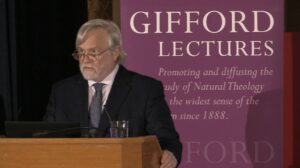Final Appreciation from Professor Stewart J. Brown
Below is the text from the Vote of Thanks given by Professor Stewart J. Brown, professor of Ecclesiastical History and Vice-Convenor of the Gifford Lectureships Committee.

It is my honour, on behalf of the Gifford Committee, to offer some concluding remarks by way of our appreciation to Professor Hempton. Now more than 133 years old, our Gifford Lectureship at the University of Edinburgh has featured some of the world’s most renowned scholar-teachers, including several associated with Harvard University. Professor Hempton has brought added lustre to this distinguished Gifford company. He has given us a beautifully crafted series of lectures, representing a lifetime of research into the history of Christianity in its global context. His lectures have been clearly presented and eloquently expressed, and he has been most generous in his responses to our questions.
In his Gifford Lectures, he has developed a new approach to the study of Christianity, one based on a model of networks, nodes and nuclei. The aim of his approach, as he has observed, is to seek insights into the lived religion of ordinary people, moving beyond the history of institutional churches, hierarchies of male leadership, religious establishments, alliances of church and state, and educated elites. His has been a bottom-up approach. His approach seeks to recover the religious beliefs, motivations and devotional practices of those outside dominant power structures and who have often left few archival records – women, the poor, the marginalised, the powerless, the enslaved, the refugees, and often the uneducated – those who often found that they had no influence in institutional Churches. He has taken a particular interest in the period after 1500, which saw mass migrations of peoples, including the African slave trade, the massive movement of Europeans to the Americas, and later the large-scale movements of political and economic refugees, as well as new technologies facilitating communications and travel.
He has emphasised those who the Irish poet W. B. Yeats called ‘the pale, unsatisfied ones’, those ‘no longer at ease here, in the old dispensation’ – those unhappy with things as they are, those disenchanted with formal institutions, and ever seeking better worlds – those for whom this life is and must be a pilgrimage. He is interested in networks and voluntary associations, both formal and informal – Pietist groups and Jesuit missionaries, Catholic pilgrims in Mexico and freed black slaves in Sierra Leone, premillennialists and Pentecostals, women missionaries and Catholic women’s orders, and ‘religious digital creatives’ of the digital age. He has not argued that his ‘networks, nodes and nuclei’ approach to the history of religion is the only one, or that it should be normative, but he has shown that it is an approach that brings fresh insights and understanding into the dynamics of change in Christianity and the transmission of cultural perspectives. The series has been exhilarating with possibilities, as we have seen especially in this final lecture.
His favoured images have not been those of linear development, but rather the exploding firework, sending creative sparks in all directions, or the forest, with its vast and interconnected root systems hidden below our vision. His is a historical vision which highlights the diversity and interconnectedness of human experiences and the value of each individual. It has been an exemplary Gifford series, exploring the natural theology of religious movements, interactions, developments and diversification.
There are many to thank this evening; as Professor Hempton once observed, it has taken a village to produce this lecture series. On behalf of the Gifford Committee, let me express our gratitude to our colleagues at Harvard University for their support to Professor Hempton as he has prepared the series; we value the connections between our two universities. On behalf of the Committee, I also wish to thank the chairpersons of the individual lectures, the bloggers who have prepared their informed, thoughtful commentaries on each lecture, the panelists in our Gifford Seminar yesterday, and the technical experts and support people. Let me express special appreciation to Mr Mark Newman, our Gifford administrator, and to Ms Victoria Turner, our Gifford social media host, who have worked so hard for the series, often well into the night. We also thank the audiences, both those in person and online, for your attention, your thoughtful questions, and your blog comments.
It has been wonderful to have David and his wife Louanne back in Scotland, where they have both previously lived and studied. We are grateful to them both for being with us over the past two weeks, and we wish them a safe trip back home to Boston. And again, David, our warmest thanks for a superb series of Gifford Lectures.




Thank you for this stimulating and enjoyable series of lectures (all of which I attended online) as well as the blog posts. They have given me much to think and reflect on.